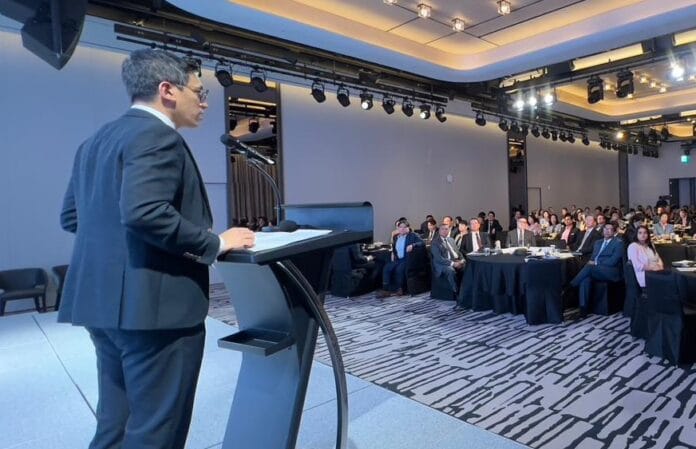The Bangladesh Investment Development Authority (BIDA) has invited South Korean investors to explore Bangladesh’s fast-evolving investment landscape, highlighting the country’s competitive edge, economic resilience, and sweeping policy reforms aimed at attracting foreign direct investment (FDI).
The call came at an investment seminar titled “Gateway to Growth: Invest in Bangladesh,” held on Tuesday at the Pullman Ambassador Seoul Eastpole Hotel in South Korea, according to a release.
The event brought together more than 150 Korean business leaders, industrialists, and development partners, where a high-level Bangladeshi delegation led by BIDA Executive Chairman (State Minister) Ashik Chowdhury showcased strategic investment opportunities across key sectors.
Organized jointly by BIDA, the Embassy of Bangladesh in Seoul, and the Federation of Korean Industries (FKI), with support from the International Finance Corporation (IFC) of the World Bank Group, the seminar underscored the deepening economic ties between Dhaka and Seoul.
South Korea is currently Bangladesh’s fifth-largest foreign investor, with a cumulative FDI stock of $1.56 billion, spread across more than 150 companies operating in sectors including textiles, footwear, electronics, and automobiles.
In his keynote address, Ashik Chowdhury described Bangladesh as a “gateway to South Asia” and a “land of new possibilities,” assuring full institutional support for Korean businesses looking to invest or expand operations in the country.
“This is the most opportune moment for Korean companies to align with Bangladesh’s growth story,” he said. “The government has undertaken comprehensive reforms to ensure ease of entry, smooth operation, and sustainable expansion for foreign enterprises. We welcome Korean investors to make Bangladesh their next growth destination.”
Bangladesh Positioned for the Next Growth Leap
BIDA’s Head of Business Development Nahian Rahman Rochi presented an in-depth overview of priority sectors—textiles, electronics, automotive manufacturing, and renewable energy—emphasizing Bangladesh’s strong demographics, macroeconomic stability, and improving infrastructure base.
“Bangladesh today mirrors South Korea’s transformative growth of the 1980s,” he said. “With a stable macroeconomic outlook, robust exports, and a business-friendly policy regime, investors can expect high returns backed by BIDA’s integrated One Stop Service platform.”
Executives from leading Korean firms already present in Bangladesh echoed this optimism. Min-Suhk Lee, President of Youngone Corporation, shared the company’s four-decade experience in Bangladesh, where it has invested more than $600 million and employs over 30,000 workers.
Lee said Youngone’s success demonstrates Bangladesh’s competitiveness as a global manufacturing hub and praised the country’s progress in sustainability and worker welfare.
“Bangladesh offers a rare combination of competitive costs, skilled manpower, and a reform-driven environment that supports long-term industrial growth,” he noted.
Expanding Bilateral Partnership
Welcoming the participants, Toufiq Islam Shatil, Ambassador of Bangladesh to the Republic of Korea, invited Korean businesses to participate in Bangladesh’s development journey.
“Bangladesh offers an unparalleled gateway to South Asia. With bold reforms led by BIDA and the government, we are ready to host a new wave of Korean investments,” he said.
Chang-beom Kim, Vice Chairman and CEO of FKI, praised the enduring 50-year friendship between the two nations and said ongoing negotiations for a Comprehensive Economic Partnership Agreement (CEPA)—launched in August 2025—would further strengthen bilateral trade and investment.
Strategic Mission to Deepen Engagement
The seminar is part of a five-day strategic mission to South Korea led by Ashik Chowdhury, joined by senior officials from BIDA, the Bangladesh Economic Zones Authority (BEZA), the National Board of Revenue (NBR), and the banking sector.
Following the seminar, the delegation met with leading Korean journalists and will hold a series of government-to-government (G2G) and government-to-business (G2B) meetings with Korean parliamentarians and corporate leaders from October 21–23. The visit will conclude with a special round table involving members of the Korean business diaspora and academia.

